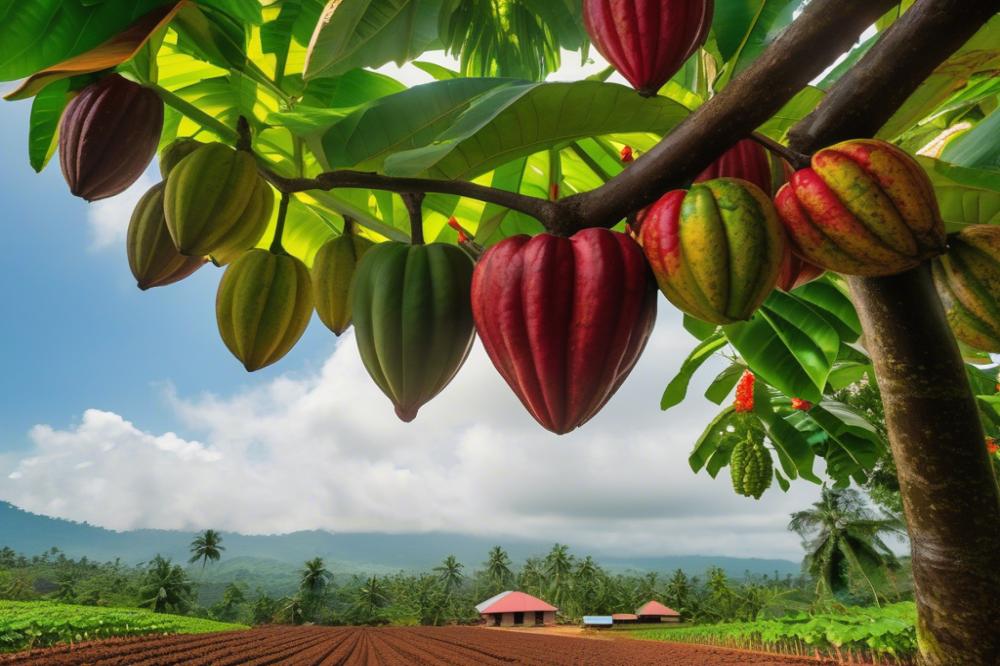Introduction
Cocoa Farming has played a vital role in shaping economies throughout history. This agricultural practice, closely tied to the chocolate industry, has influenced trade and commerce in various regions. Many people enjoy chocolate today, but few realize its origins and economic significance.
In regions like Central America and West Africa, cocoa production has been a key driver of rural development. Farmers often rely on this crop to support their livelihoods. Export markets for cocoa have surged, leading to increased demand and competition. This demand impacts local economies profoundly, creating opportunities for sustainable farming and improving overall agricultural economics.
Studying the economic impact of this crop provides insights into more than just a favorite treat. Fair trade initiatives have emerged in response to the need for equitable practices in the cocoa market. By understanding these dynamics, we can appreciate how Cocoa Farming not only supports local communities but also contributes to the Global Economy.
As we delve deeper into the relationship between cocoa and global markets, the importance of these agricultural practices becomes clearer. The chocolate industry is far more than a simple indulgence; it is a cornerstone of economic activity in many developing nations.
Cocoa Farming: Origins and Evolution
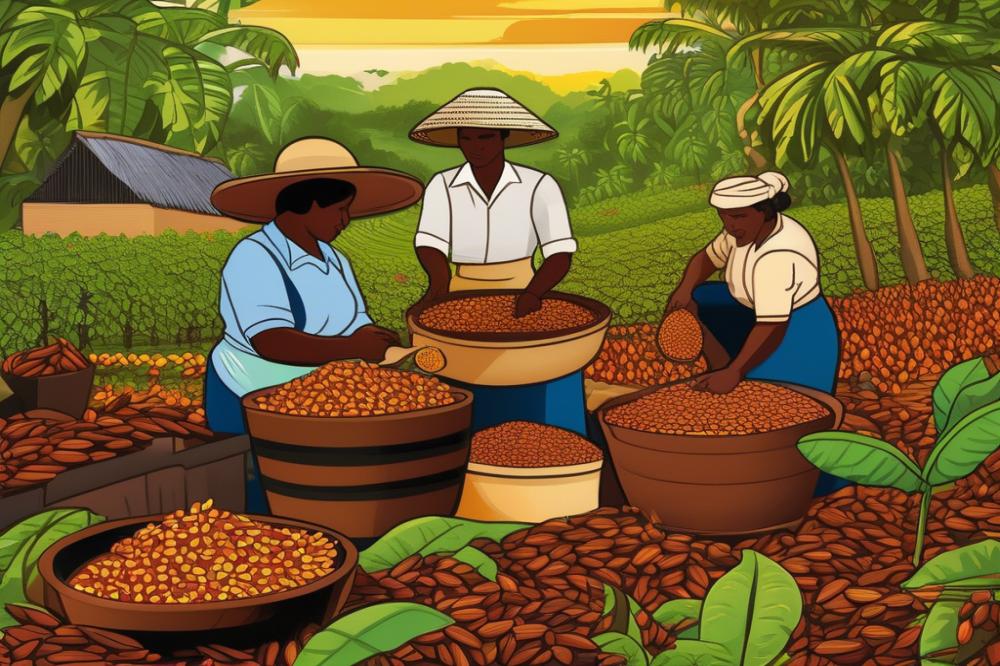
The history of cocoa farming is rich and fascinating. Indigenous peoples in Central America first cultivated cacao. They used it to create a drink prepared with the beans from the cacao tree. This beverage was often reserved for rituals and special occasions. Over time, cacao gained popularity, becoming a part of trade networks.
As the chocolate industry grew, it became clear that demand was soaring. European explorers brought cacao back from the Americas in the 16th century. This sparked interest and led to an increase in cultivation. Eventually, cocoa production spread across various regions, especially to West Africa. Countries like Ghana and Ivory Coast became major players in export markets.
The impact on agricultural economics in these regions was significant. Rural development benefited greatly from the boom in cocoa. Communities found jobs and entrepreneurs emerged. Fair trade initiatives also began to take shape, focusing on sustainable farming practices. These efforts aimed to provide better income for farmers and ensure fair compensation.
Today, the chocolate industry relies heavily on West African cocoa. This region supplies a large portion of the world’s cacao. However, challenges remain. Issues like deforestation and child labor must be addressed. Sustainable farming methods are key to securing a future for cocoa farmers. By fostering responsible practices, communities can thrive while protecting their land.
Economic Impact of Cocoa Farming
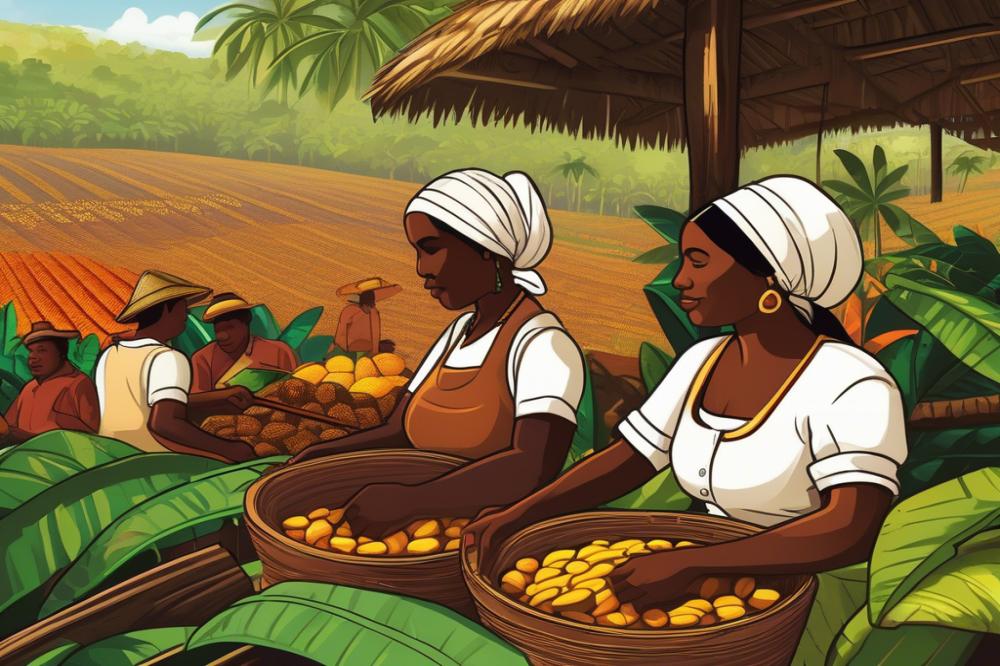
The contribution to local and national economies from cocoa farming is quite significant. In many regions, it acts as a major source of income for families. Many farmers rely on cocoa production to provide basic needs for their households. In West Africa, for example, cocoa is not just a crop; it is the backbone of local livelihoods. Revenue from this crop can enhance rural development in areas where opportunities are limited.
Role in agricultural economics cannot be understated. Cocoa farming creates jobs, from cultivation to harvesting. Additionally, it provides work in processing and distribution. This ripple effect stimulates local markets and improves the economy. Farmers also invest in their communities using profits. Schools and healthcare facilities benefit due to added resources from cocoa sales.
Export markets rely heavily on this agricultural commodity. Countries such as Ivory Coast and Ghana lead the world in cocoa exports. They ship vast amounts of cocoa beans to meet the global demand, especially in the chocolate industry. Fair trade practices have emerged in response to the need for sustainable farming. These practices support better wages and working conditions for farmers. Ultimately, cocoa plays a crucial role in the Global Economy, shaping trade patterns and influencing prices worldwide.
Every bar of chocolate tells a story of economic impact. The cash flow generated by cocoa farming improves countless lives. In Central America, cocoa farming is gaining recognition for its potential as a cash crop. Programs promoting sustainable practices help balance productivity with environmental health. The cycle of farming contributes to regional economic stability. It engages communities in efforts for development, showing how agriculture can link to broader economic success.
Rural Development and Community Growth
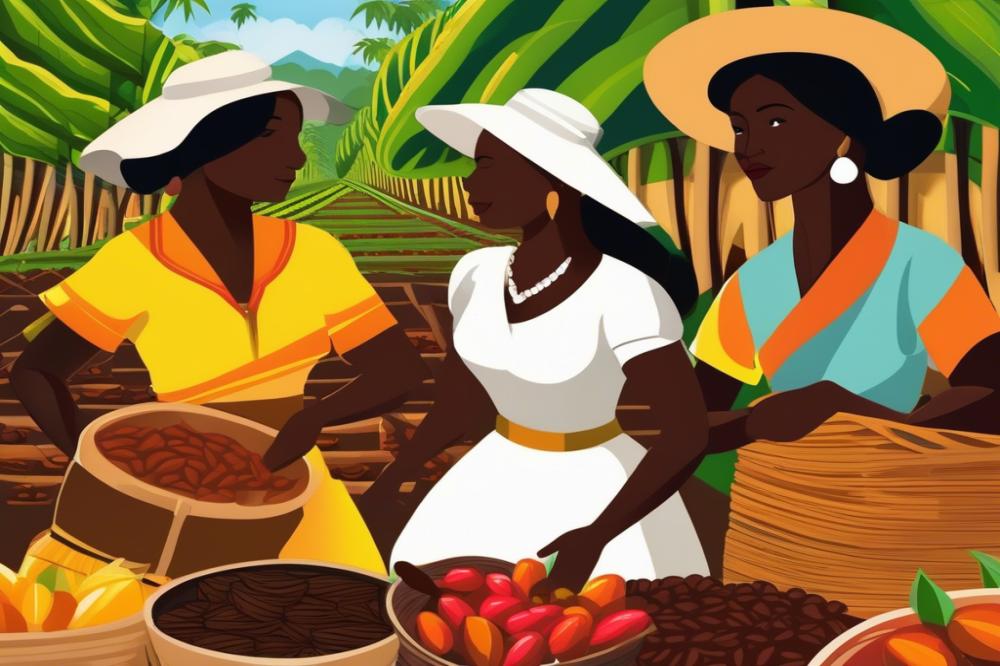
Cocoa farming acts as a powerful engine for rural development, especially in regions like Central America and West Africa. By providing a steady income, it lifts families out of poverty. As a result, local economies thrive, creating better opportunities for everyone. The chocolate industry drives demand, making it a valuable crop.
Communities benefit significantly from cocoa production. Basic infrastructure often improves, with roads and schools getting built. Access to clean water and healthcare services also increases as revenues rise. Stronger neighborhoods emerge when farmers can reinvest their earnings back into their communities.
Employment opportunities multiply with the growth of cocoa farming. More jobs become available in farming, processing, and even exporting goods to international markets. Livelihoods become stable, reducing the need for families to migrate elsewhere in search of work. Sustainable farming practices can further enhance this stability while protecting the environment.
Fair trade initiatives promote better wages for farmers, ensuring they receive a decent price for their crops. Thus, rural populations feel empowered, knowing their hard work translates into real benefits. Through these efforts, agricultural economics shows another layer of how cocoa farming reshapes lives.
In short, the economic impact is profound. Families with reliable income can invest in their children’s education and health. Ultimately, this leads to a more educated workforce, driving local development long-term. The cycle of production, profit, and community growth creates lasting change.
Sustainable Farming Practices in Cocoa Production
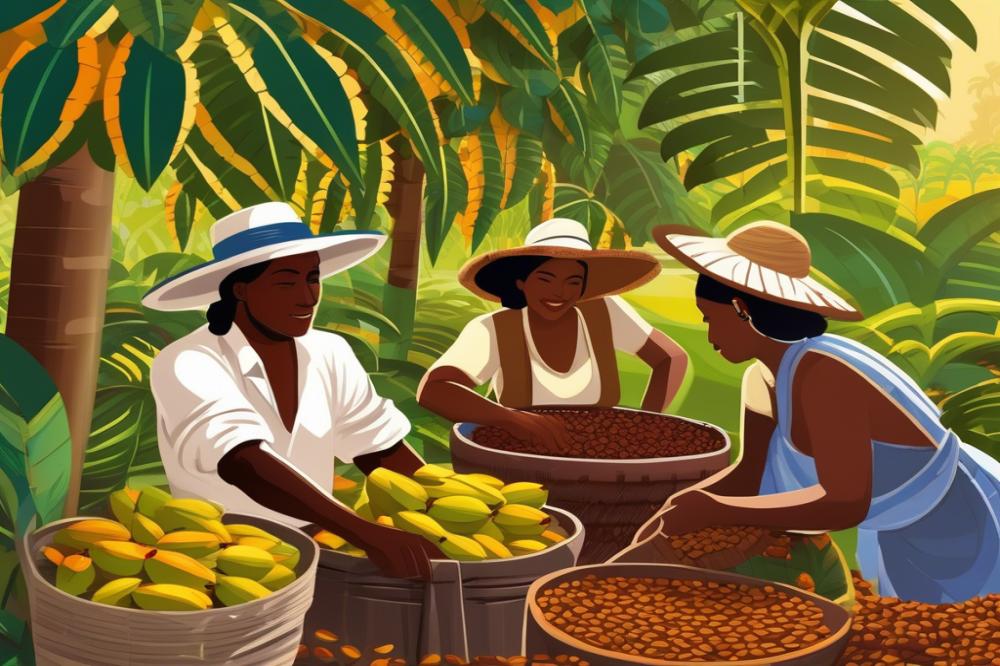
The future of the chocolate industry depends heavily on sustainable farming practices. As demand for chocolate continues to rise, cocoa growers face significant challenges. Environmental issues play a major role in how farmers manage their crops. Deforestation, changing climates, and pests threaten yields. Without proper management, cocoa production could decline, impacting millions who rely on it for their livelihoods.
Cocoa farmers often struggle with poverty, low prices, and unstable market conditions. These factors complicate their ability to invest in better farming techniques. Additionally, smallholder farmers, especially in Central America and West Africa, face limited access to resources and training. Many lack knowledge of sustainable practices that can improve soil health and increase productivity. This situation creates a cycle of hardship that can be difficult to break.
Fortunately, several initiatives are underway to promote sustainable cocoa farming. Fair trade programs offer better prices and support rural development. These programs focus on empowering farmers and improving their economic impact. By participating, farmers can gain access to export markets that value sustainable methods. Other organizations provide training in agroforestry, teaching farmers how to grow cocoa alongside other crops. Such techniques can boost biodiversity and provide additional income sources.
Successful partnerships have emerged between cocoa producers and companies committed to sustainability. These collaborations help communities adopt best practices in agricultural economics. Farmers receive guidance on techniques that can protect their environment while boosting income. Ultimately, these initiatives not only benefit farmers but also ensure quality cocoa for the chocolate industry.
Fair Trade and Ethical Considerations
Overview of Fair Trade Initiatives in Cocoa Farming
Fair trade initiatives have become an essential part of the chocolate industry. These programs promote sustainable farming practices and better trading conditions for farmers. They work directly with communities in regions such as West Africa and Central America. By providing support and training, fair trade organizations help farmers increase their yields and improve their livelihoods. Certifications allow consumers to identify products that meet ethical standards. This has increased awareness and demand for fairly traded chocolate.
Economic Benefits of Fair Trade for Farmers
Farmers involved in fair trade often enjoy higher incomes. Fair trade prices provide a safety net during market fluctuations. This price stability allows farmers to invest in their farms and families. Additionally, fair trade encourages cooperative connections among farmers. This sense of community can lead to better rural development. When farmers earn more, they can improve local economies and support education and health initiatives. The ripple effect of these benefits fosters sustainable growth.
Impact on Consumer Choices and Awareness
Consumer choices have changed significantly due to fair trade movements. Shoppers are increasingly looking for ethically sourced products. This shift in awareness helps drive demand for fair trade chocolate. As more people choose these products, companies take notice. They begin to source cocoa from fair trade suppliers to meet consumer expectations. In turn, this creates a positive economic impact on farmers around the world. Awareness of fair trade also raises questions about our agricultural economics and the sustainability of cocoa production. Understanding these issues leads to informed decisions in the marketplace.
Closing Thoughts on Cocoa’s Economic Impact
Cocoa farming has played a vital role in shaping economies across the globe. From small villages in West Africa to bustling factories in Europe, the cocoa trade connects many lives. Farmers depend on this crop for their livelihood, while consumers crave the sweet products made from it. The chocolate industry thrives on this integral relationship, generating billions in revenue each year.
Looking ahead, the future of the cocoa market looks promising but requires careful attention. A rising demand for ethically sourced chocolates presents a unique opportunity. Consumers are becoming more conscious of where their food comes from. This trend boosts interest in sustainable farming, which can help communities thrive. If farmers adopt better practices and benefit directly, it can lead to a more balanced supply chain.
Change is possible, but everyone has a role to play. Supporting fair trade practices can make a real difference. When you choose products from brands that prioritize fairness, you help create a just marketplace for farmers. The choices made by consumers today will shape the cocoa economy of tomorrow. Let’s take action and support the people who grow the cocoa that delights our taste buds. Together, we can promote a bright and equitable future for all involved.

